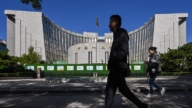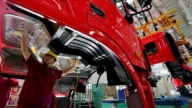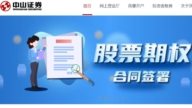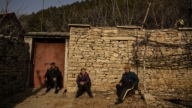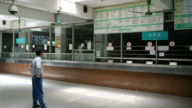【新唐人2014年04月25日讯】中共国务院常务会议日前通过﹕80个基础设施等示范领域,将开放让民间资本参与建设营运。而经济学者、专家则认为,基础建设是服务大众的项目,任何国家都是由政府在做,中共在中国经济衰退的当前,突然开放基础建设项目让民间投资,显示政府没钱了,或是地方政府债务已经过高,政府不愿再背债。因此专家提醒,在基础建设已经无利可图,而民众的投资却无法公开透明监督的情况下,民众要自保,不要上当了。
中共国务院总理李克强,4月23号主持召开国务院常务会议,会中决定﹕让社会资本,特别是民间投资,进入一些具有自然垄断性质、或过去以政府资金和国企投资为主导的领域。
会议决定,在铁路、港口等交通基础设施,新一代信息基础设施,重大水电、风电、光伏发电等清洁能源工程,以及油气管网及储气设施、现代煤化工和石化产业基地等方面,首批推出80个示范项目,面向社会公开招标。
而社会大众资本可以透过合资、独资、及特许经营等方式,参与建设营运。
另外,国务院下一步将推动油气勘查、公用事业、水利、机场等领域,扩大向社会资本开放。
这项被当局称为“落实企业投资自主权”的政策措施,外界却认为是个圈套,是另一个掠夺民间资本的陷阱。
美国南卡罗莱纳大学艾肯商学院教授谢田﹕“这实际上是个陷阱,也是个圈套,因为实际上我们知道现在中国的经济非常严重的衰退,不管是通货膨涨也好、房地产泡沫也好、股市也好、地方债务问题,都出现非常严峻的状况,中国的国有银行他们也在大量的闹钱荒,事实上是国家没钱了﹗”
美国“南卡罗莱纳大学艾肯商学院”教授谢田介绍,正常的国家,基础建设项目都是由国家、政府投资,因为建设项目是服务于大众的,并且投资周期长、投资回报率低,所以一般民间没有人愿意做。
而《新唐人》特约经济评论专家马杰森也表示,当前中国的经济发展环境严峻,需要基础建设来刺激经济发展,但是政府不愿再背债搞建设。
《新唐人》特约经济评论专家马杰森﹕“比如说各个地方搞的收费公路,各个地方政府赚的都很厉害,但是再往下发展起来的话就没有很好的项目,而且地方政府的债务已经很多了,比如说再修的公路都是很边缘的,车流量各方面都很少,但是为了基础建设而基础建设,这样的项目往往是不想再让地方政府背这个债了。”
谢田﹕“那中共这时候为什么突然开放呢﹖就是因为它这个政府没钱了,或是地方政府债务过高,它把这种本来无利可图的东西让中国老百姓、民间资本参与,这个是非常不负责任,非常恶劣的做法。”
虽然中共国务院的这项所谓“企业投资自主权”的政策措施,是为“促进市场公平竞争、维护市场正常秩序工作”。但谢田提醒,老百姓现在掏出了钱,却失去了对这笔钱使用的监督,并且无法从中得到太多的好处。
谢田﹕“我们也知道,它这个政府的运作,项目的招标,到项目的实施都没有一个公开、透明的监督,实际上这些钱进入以后,都被中共的官员给贪污掉了,所以在这个时候他们这样做的话,实际上是…无疑是另外一种掠夺民间资本的办法。所以我觉得这是非常恶劣的建议。中国老百姓最好是好好的自保,不要上当。”
马杰森表示,当局拿老百姓的钱做基础建设,一方面“省得它地方政府背一屁股债”,同时也避免“把它银行体系给拖垮”了。
采访/陈汉 编辑/周平 后制/孙宁
Experts: A Trap For Opening the Infrastructure Investment Market to the Private Sector
In recent days the State Council to the Chinese Communist Party (CCP), issued a new policy: 80 pilot infrastructure projects will be opened to private funds, involving construction and operation. However, economists and experts all agreed, the main purpose of infrastructure, is to serve the public, and in many countries, this has been provided by the government.
Under the situation of China’s economy recession however, abruptly opens up the infrastructure projects to private investors, showing how the government is running out of valuable funds, becoming overburdened by local government debt, and thus a reflection of why main government bodies, are unwilling to increase their debt. Experts remind us, there is no profit investing in the infrastructure of China, and the private investment cannot be openly and transparently monitored. So people need to protect themselves without being fooled.
The CCP’s Premier Li Keqiang, presided over a meeting of State Council on April 23. The meeting determined: allowing social capital, especially private funds, to invest in projects in the areaswhich feature natural monopoly, or previously dominated public funds and state-owned enterprise investment.
The meeting also made a decision to give public bidding for the first batch of 80 pilot projects, among which transport infrastructure, including railway and harbour, new generation information infrastructure, clean energy including major hydroelectric engineering, wind power and photovoltaic power generation, oil and gas pipeline and storage facilities, modern coal chemical industry and petrochemical industry base.
Social private capitals are allowed to get involved in the infrastructure of construction and operation. This can be initiated through joint venture, sole proprietorship, and franchised operations.
In addition, the State Council will further expand other fields, including oil & gas prospecting, public works, irrigation and airport, all open to the social capital.
Such a policy “Implementing enterprise investment autonomous rights,” as such named by the CCP Authorities, is being regarded by experts as a trick and another trap for robbing private funds.
Marketing Professor Frank Xie at University of South Carolina Aiken: “This is actually a trap and a trick. Because actually we know, the current Chinese economy is in a serious recession. Whatever the scenario is, be it inflation, property bubble, security market or local government debt, they are in fact all in a very precarious and dangerous status.
China’s state-owned banks are all short of money. In fact, the nation has no money!”
Professor Frank Xie says, in a normal country, infrastructure projects are invested in by the nation and government. Because these projects are served for the public, investment cycle is long with low returns, private investors are unwilling to invest in such projects.
Special commentator for NTD Jason Ma, says the current Chinese economic status, has hit hard times. It needs infrastructure construction to stimulate economic development and growth, yet governments do not wish to construct infrastructure through borrowing, thus creating more debt.
Jason Ma: “For instance, local governments across China made a lot of money from toll roads. But there seems to be no future projects on the cards. The debts of local government has been very high too. The new highway located in remote areas with low traffic volume. These infrastructure projects, which serve only themselves rather than for any real demand, generate debt but local government will not bear the brunt of such a burden.”
Professor Xie: “So why does the CCP open it (toll road) now? It’s because the government has no money, and also due to the high debts of local governments. It is very irresponsible and wicked of the CCP, to allow Chinese private funds to be involved in such profitless projects.”
The true purpose of the so called “Implementing enterprise investment autonomous right” policy, is to “promote market’s fair competition and maintain normal order of the market”. But Professor Xie reminded us that, it is the ordinary people who paid their money in to invest, but they lost the monitor on the money and are now unable to make on any returns.
Professor Xie: “We all know, the operation, public bidding and project implementation of such governments, have no open and transparent monitor. In fact, such money used for investment is embezzled by the CCP officials. So at such a time they are producing this policy, they are in fact… without doubt, creating a way to loot such funds. I think this is a very wicked policy. Chinese people had better protect themselves without being fooled.”
Jason Ma expresses, the Authorities use Chinese people’s money to invest in infrastructure construction, on the other hand, “avoiding local governments taking on the debts, thus avoiding a total collapse within the entire system.”


